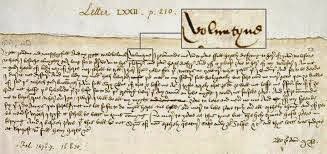Last week I wrote a
post about the background to the tradition of sending Valentine cards. If you remember, it is said, that the first Valentine card was sent in February 1477 from Margery Brews to John Paston. I can say that I was quite surprised when I started my
Future Learning course with the University of Leicester on England at the time of Richard III, and looking at documents as sources to learn more about history, the name Paston turned up. Yes, it is one of the many Johns in the family that received this Valentine card from Margery Brews. They later married so the outcome was a happy one. Here is the text of what turns out to be two letters or cards (from
The Project Gutenberg).
MARGERY BREWS TO JOHN PASTON
Unto my ryght welebelovyd Voluntyn, John Paston, Squyer, be this bill delyvered, &c.
1477
FEB.
RYGHT reverent and wurschypfull, and my ryght welebeloved Voluntyne, I recomande me unto yowe, ffull hertely desyring to here of yowr welefare, whech I beseche Almyghty God long for to preserve un to Hys plesur, and yowr herts desyre. And yf it please yowe to here of my welefar, I am not in good heele of body, nor of herte, nor schall be tyll I her ffrom yowe;
For there wottys no creature what peyn that I endure,
And for to be deede, I dare it not dyscure [discover].
And my lady my moder hath labored the mater to my ffadur full delygently, but sche can no mor gete then ye knowe of, for the whech God knowyth I am full sory. But yf that ye loffe me, as I tryste verely that ye do, ye will not leffe me therefor; for if that ye hade not halfe the lyvelode that ye hafe, for to do the grettest labur that any woman on lyve myght, I wold not forsake yowe.
And yf ye commande me to kepe me true wherever I go,
I wyse I will do all my myght yowe to love and never no mo.
And yf my freends say, that I do amys,
Thei schal not me let so for to do,
Myne herte me bydds ever more to love yowe
Truly over all erthely thing,
And yf thei be never so wroth,
I tryst it schall be better in tyme commyng.
No more to yowe at this tyme, but the Holy Trinite hafe yowe in kepyng. And I besech yowe that this bill be not seyn of none erthely creatur safe only your selffe, &c.
And thys letter was indyte at Topcroft, with full hevy herte, &c.
By your own,
Margery Brews.
MARGERY BREWS TO JOHN PASTON
To my ryght welebelovyd cosyn, John Paston, Swyer, be this letter delyveryd, &c.
1477
FEB.
RYGHT wurschypfull and welebelovyd Volentyne, in my moste umble wyse, I recommande me un to yowe, &c. And hertely I thanke yowe for the lettur whech that ye sende me be John Bekarton, wherby I undyrstonde and knowe, that ye be purposyd to come to Topcroft in schorte tyme, and withowte any erand or mater, but only to hafe a conclusyon of the mater betwyx my fader and yowe; I wolde be most glad of any creatur on lyve, so that the mater myght growe to effect. And ther as ye say, and ye come and fynde the mater no more towards you then ye dyd afortyme, ye wold no more put my fader and my lady my moder to no cost ner besenesse, for that cause, a good wyle aftur, wech causyth myne herte to be full hevy; and yf that ye come, and the mater take to none effecte, then schuld I be meche mor sory and full of hevynesse.
And as for my selfe, I hafe done and undyrstond in the mater that I can or may, as Good knowyth; and I let yowe pleynly undyrstond, that my fader wyll no mor money parte with all in that behalfe, but an Cli. and l. marke, whech is ryght far fro the acomplyshment of yowr desyre.
Wherfore, yf that ye cowde be content with that good, and my por persone, I wold be the meryest mayden on grounde; and yf ye thynke not yowr selffe so satysfyed, or that ye myght hafe mech mor good, as I hafe undyrstonde be yowe afor; good, trewe, and lovyng volentyne, that ye take no such labur uppon yowe, as to come more for that mater, but let is [it ?] passe, and never more to be spokyn of, as I may be yowr trewe lover and bedewoman duryng my lyfe.
269
No more un to yowe at thys tyme, but Almyghty Jesus preserve yowe, bothe body and sowle, &c.
Be your Voluntyne,
Margery Brews.
Imagine that we can read this more than 500 years afterwards. Is not history and old letters wonderful? These days we don't send letters anymore. Who will read our e-mails in the future? And how can these e-mails be seen as sources to things happening in our times? Not likely at all.







Comments
Post a Comment